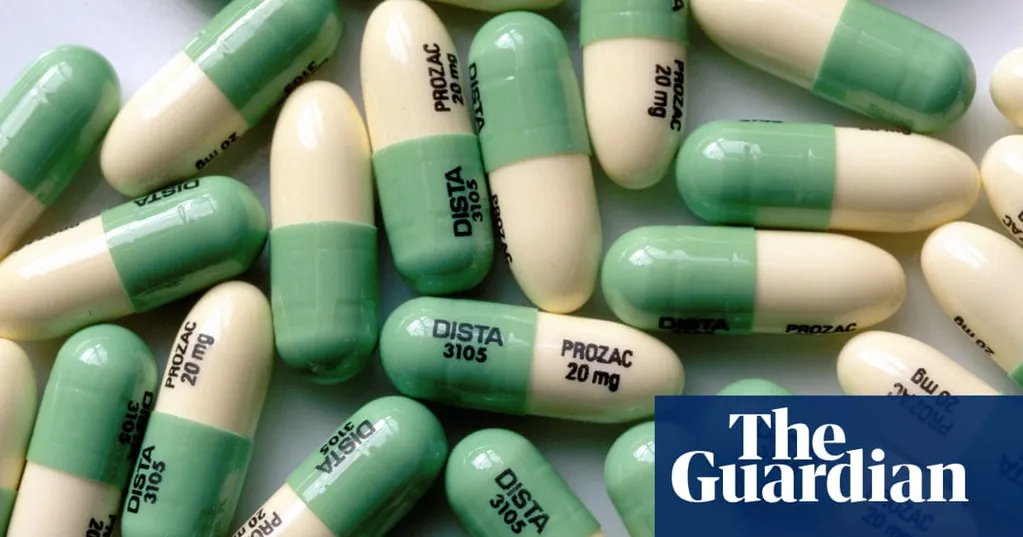Clinical guidelines should no longer recommend Prozac for children, according to experts, after research showed it had no clinical benefit for treating depression in children and adolescents.
Globally one in seven 10-19 year olds have a mental health condition, according to the World Health Organization. In the UK, about a quarter of older teenagers and up to a fifth of younger children have anxiety, depression or other mental health problems.
In the UK, National Institute for Health and Care Excellence (Nice) guidance says under-18s with moderate to severe depression can be prescribed antidepressants alongside therapy.
But a new review of trial data by academics in Austria and the UK concluded that fluoxetine, sold under the brand name of Prozac among others, is clinically no better than placebo drugs in treating depression in children, and should therefore no longer be prescribed to them.
The authors conducted a meta analysis of 12 large trials involving Prozac, published between 1997 and 2024, and concluded that fluoxetine improved children's depressive symptoms so little as to not be considered clinically meaningful.
"Consider the analogy of a weight-loss drug that is better than placebo at producing weight loss, but the difference is only 100 grams," said Martin Plöderl, a clinical psychologist at Paracelsus Medical University in Salzburg, Austria, and lead author of the study. "This difference is unlikely to be noticeable to the patient or their doctors or produce any difference in their overall condition."
The study, published in the Journal of Clinical Epidemiology, identified a "novelty bias" in early trials, which were likely to be more positive, while later studies fail to confirm these effects. It concludes that the potential risks of harmful side-effects of fluoxetine are likely to outweigh any potential clinical benefit.
The most common side-effects experienced by children on antidepressants are weight gain, sleep disturbance and concentration problems. They can also increase suicidal ideation.
The authors also examined clinical guidelines in the US and Canada and found that just as in the UK, they ignored evidence that Prozac was clinically equivalent to placebo and continued to recommend its use for children and adolescents with depression.
Mark Horowitz, an associate professor of psychiatry at Adelaide University and a co-author of the study, said: "Fluoxetine is clearly clinically equivalent to placebo in its benefits, but is associated with greater side effects and risks. It is difficult to see how anyone can justify exposing young people to a drug with known harms when it has no advantage over placebo in its benefits."
"Guidelines should not recommend treatments that are equivalent to placebo. Many clinicians take the common-sense approach that we should seek to understand why the young person feels depressed and address the factors that are contributing to it."
"Guidelines in the UK and around the world currently recommend treatments for children with depression that are not in line with the best evidence. This exposes young people to the risks of medication without any benefit over placebo."
The long-term effects of antidepressants in children and adolescents were "poorly understood" and research among adults showed risks included serious side effects that may be long-term and in some cases persist after stopping the medication, he added.
Responding to the findings, a Nice spokesperson said: "Mental health is a priority for Nice and we recognise that depression in young people is a serious condition that affects each differently, which is why having a range of treatment options is essential for clinicians. Our guideline recommends a choice of psychological therapies as first line treatment options for children and young people with depression."
"Nice recommends that children and young people with moderate or severe depression are reviewed by specialist teams. Antidepressants may be considered in combination with psychological therapy for moderate to severe depression in some cases and only under regular specialist supervision."
Prof Allan Young, chair of the Royal College of Psychiatrists' Academic Faculty, said that the study should be interpreted with "caution". "Clinical guidelines weigh many factors beyond average effect size, including safety, feasibility, and patient preferences. It is important that prescribed medication demonstrate consistent evidence and safety data," he said.
